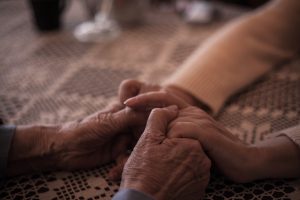Caregiver Basics
If the only contact we have is through these pages, please consider the following very basic points.
Emergency Preparedness

Care begins with connecting to where they are at.
In the course of care, you will likely need to deal with more than one medical emergency. Are you and your parents prepared? Don’t ever hesitate to call 911, even when your parents are resistant. Seniors can decline quickly and our healthcare system relies on the hospital ER to provide immediate care so deeper crisis does not occur. Be prepared by preparing (and keeping current) copies of documents ahead of time for the emergency room physician and the hospital administration. These documents include:
- Brief medical history
- List of current physicians
- List of prescriptions
- Advanced health care directives or power of attorney
- Copies of social security and supplemental insurance cards
- POLST document
Have copies you can deliver/email/fax to the hospital and a copy kept with your parent(s) that will go with your parent to the hospital. Also plan in advance who you will call and what support will be required, if one parent is at home and another is in the hospital.
End-of-life Conversations
Anyone over fifty should have an Advanced Health Care Directive designating who will make decisions when he or she cannot. Appointed individuals should be clear on the wishes of the elderly. These are sometimes very difficult conversations and yet they are very important. Don’t wait until later. Begin the conversation the best way you know how and stay focused on your care for them and your need to know how to make decisions if they can not. The end-of-life conversation is usually a dialog over an extended period of time. It is about hopes, dreams and fears. It is also about the fullness of a life and the opportunity to sum up with forgiveness, compassion and love. But you can do that unless you start talking about things.
Their Story
Regardless of the stress that you experience in caring for your parents, remember the care is about *their* experience. Often this means a new relationship in which you are a steward and a witness. Whatever is going on, it is happening to them and it is part of their story. Try not to get caught in old relationship dynamics. Indeed, compassionate attention and interest in the fullness of their story can be quite beneficial and build new awareness and connections. This is not to say that your experience is not important or to be ignored. I believe the opposite is true. Parent care is a significant movement in your own journey and will become part of your story. In some cases, you will simply need to express it elsewhere. In others you will need to wait for the time and place that it is called.
Selfcare
You can’t care for another if you do not take care for yourself. You also can’t muster full compassion for another unless you have compassion for yourself. Too many caregivers deny their own needs or prioritize the parents needs to the exclusion of tending to themselves. This is a loosing proposition. Care can not be sustained without a healthy caregiver. And don’t kid yourself, you are a caregiver if you are involved in any way tending to the affairs of your parent. Over time, you will experience many difficult emotions and stressful situations. Take care of yourself. Look to your mind, body, and spirit. Plan regular time, no matter how small, for something that feeds you or is simply a guilty pleasure. Enlist the help of your friends and community to support you.